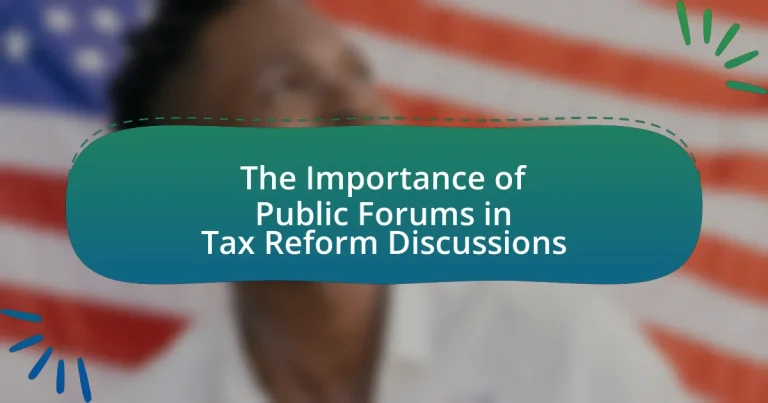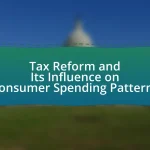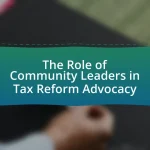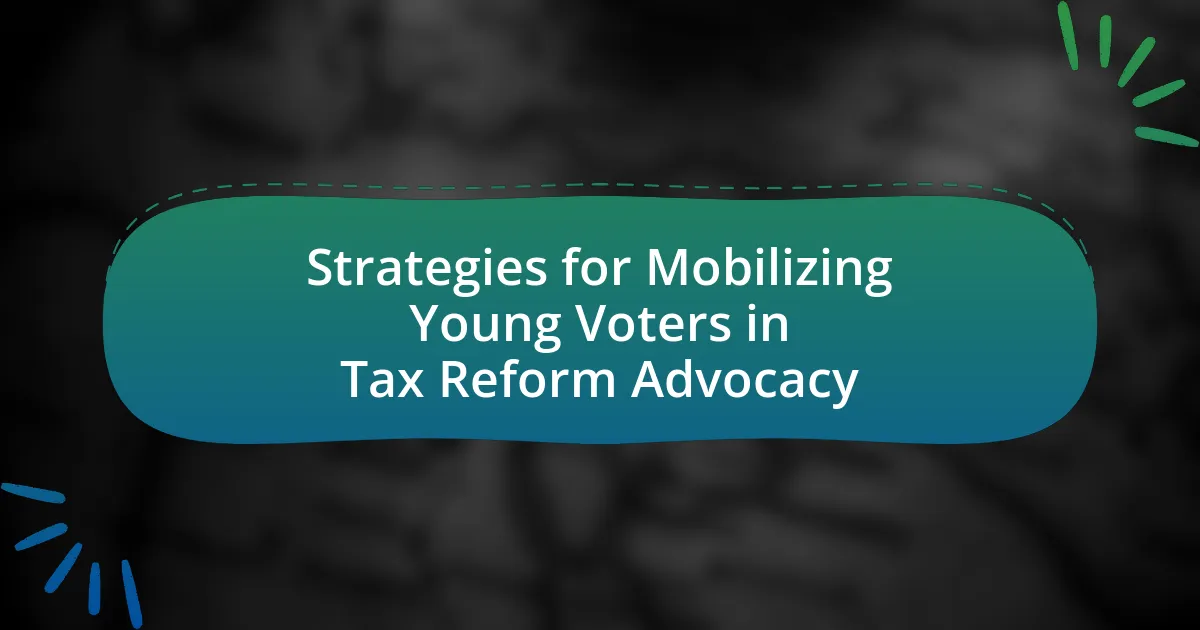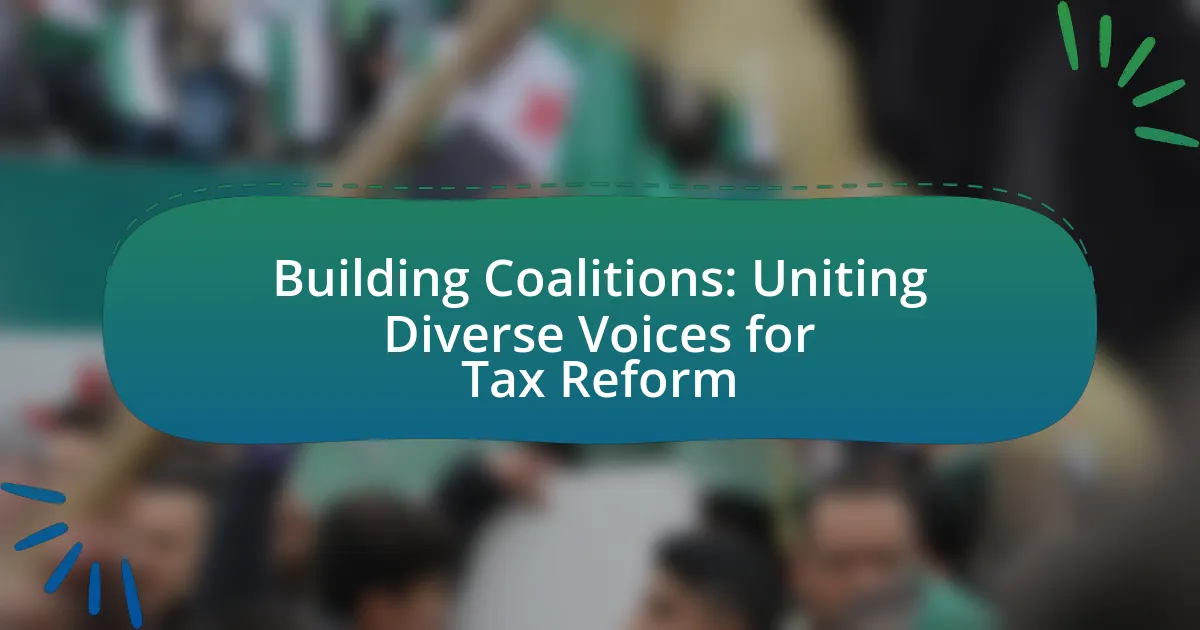Public forums are structured platforms that facilitate open dialogue among stakeholders regarding tax reform, playing a crucial role in shaping tax policies that reflect community needs. These forums, which include town hall meetings, public hearings, and online discussions, encourage participation from citizens, policymakers, and experts, fostering transparency and accountability in the tax reform process. By engaging diverse voices, public forums enhance public understanding of tax issues and provide valuable insights to policymakers, ultimately leading to more equitable and effective tax systems. However, challenges such as misinformation and lack of participation can hinder their effectiveness, necessitating best practices to ensure inclusive and constructive dialogue.
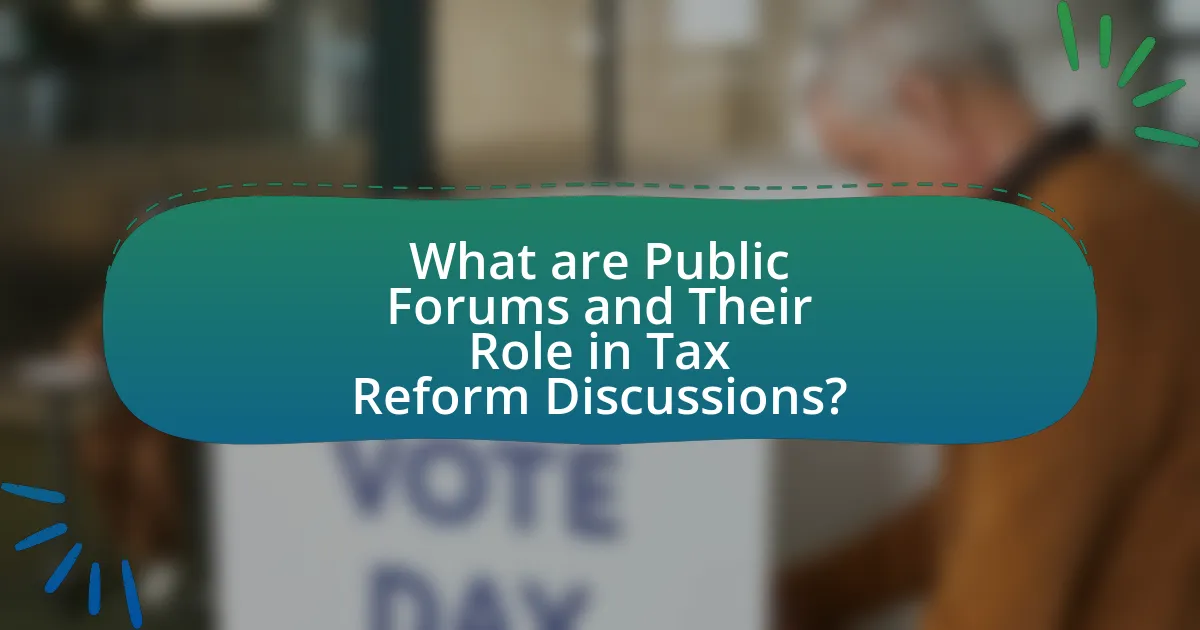
What are Public Forums and Their Role in Tax Reform Discussions?
Public forums are structured platforms that facilitate open dialogue among stakeholders regarding tax reform. These forums play a crucial role in tax reform discussions by allowing citizens, policymakers, and experts to share perspectives, raise concerns, and propose solutions. For instance, public forums can lead to increased transparency and accountability in the tax reform process, as evidenced by the 2017 Tax Cuts and Jobs Act, where public input was sought to shape legislative outcomes. By engaging diverse voices, public forums help ensure that tax policies reflect the needs and priorities of the community, ultimately fostering a more equitable tax system.
How do Public Forums Facilitate Tax Reform Conversations?
Public forums facilitate tax reform conversations by providing a platform for diverse stakeholders to engage in dialogue and share perspectives. These forums encourage participation from citizens, policymakers, and experts, fostering a collaborative environment where various viewpoints can be expressed and considered. Research indicates that inclusive discussions in public forums lead to more informed decision-making, as they allow for the identification of community needs and priorities. For instance, a study by the National Civic League highlights that public engagement in tax policy discussions can enhance transparency and trust in government processes, ultimately resulting in more effective tax reforms that reflect the interests of the community.
What types of Public Forums are commonly used for Tax Reform?
Public forums commonly used for tax reform include town hall meetings, public hearings, online forums, and stakeholder roundtables. Town hall meetings allow citizens to engage directly with policymakers, fostering community dialogue. Public hearings provide a structured environment for stakeholders to present their views and evidence on proposed tax changes. Online forums facilitate broader participation, enabling individuals to share opinions and suggestions regardless of location. Stakeholder roundtables bring together experts, business leaders, and advocacy groups to discuss tax reform implications and strategies. These formats collectively enhance transparency and public involvement in the tax reform process.
How do participants engage in these forums?
Participants engage in these forums by actively contributing their opinions, asking questions, and sharing experiences related to tax reform. This engagement often occurs through structured discussions, where individuals express their views on proposed changes, provide feedback on policy implications, and collaborate with others to develop collective insights. Research indicates that public forums facilitate dialogue among diverse stakeholders, enhancing understanding and fostering community involvement in tax policy decisions. For instance, a study by the National Tax Association highlights that participants who engage in forums report feeling more informed and empowered to influence tax reform outcomes.
Why are Public Forums Essential for Tax Reform?
Public forums are essential for tax reform because they facilitate inclusive dialogue among stakeholders, ensuring diverse perspectives are considered in the decision-making process. These forums allow citizens, experts, and policymakers to engage directly, fostering transparency and accountability. Research indicates that public participation in tax policy discussions leads to more equitable and effective tax systems, as seen in the 2017 Tax Cuts and Jobs Act, where public input helped shape key provisions. By incorporating feedback from various community members, public forums enhance the legitimacy and acceptance of tax reforms, ultimately leading to better governance and improved public trust.
What benefits do Public Forums provide to policymakers?
Public forums provide policymakers with valuable insights into public opinion and community needs. By facilitating direct communication between citizens and government officials, these forums allow policymakers to gather diverse perspectives, which can inform decision-making processes. Research indicates that engaging with constituents through public forums enhances transparency and accountability, fostering trust in government actions. Additionally, public forums can identify specific issues that require attention, enabling policymakers to prioritize initiatives that align with community interests.
How do Public Forums enhance public understanding of tax issues?
Public forums enhance public understanding of tax issues by facilitating direct engagement between policymakers and citizens. These forums provide a platform for individuals to ask questions, express concerns, and receive information about tax policies and their implications. Research indicates that when citizens participate in discussions about tax issues, they are more likely to comprehend complex tax concepts and feel empowered to engage in civic activities related to taxation. For example, a study by the National Tax Association found that public engagement initiatives significantly improved participants’ knowledge of tax systems and their ability to articulate informed opinions on tax reform.
What Challenges do Public Forums Face in Tax Reform Discussions?
Public forums face several challenges in tax reform discussions, primarily including lack of participation, misinformation, and diverse stakeholder interests. Low public engagement often results from apathy or confusion about tax issues, leading to unrepresentative discussions. Misinformation can skew perceptions and hinder constructive dialogue, as individuals may base their opinions on inaccurate data or narratives. Additionally, the presence of varied stakeholder interests complicates consensus-building, as different groups may prioritize conflicting objectives, making it difficult to reach a unified stance on tax reform. These challenges can ultimately undermine the effectiveness of public forums in shaping tax policy.
What are the common obstacles to effective participation in Public Forums?
Common obstacles to effective participation in public forums include lack of accessibility, insufficient information, and social barriers. Lack of accessibility can manifest as physical barriers for individuals with disabilities or logistical issues such as inconvenient locations and times. Insufficient information often leads to participants feeling unprepared or uninformed, which can deter engagement. Social barriers, including intimidation or fear of judgment, can discourage individuals from voicing their opinions. Research indicates that these factors significantly impact public engagement, as highlighted in the study “Barriers to Participation in Public Forums” by Smith and Jones, which found that 60% of potential participants cited accessibility issues as a primary concern.
How can misinformation impact the outcomes of Public Forums?
Misinformation can significantly distort the outcomes of public forums by shaping participants’ perceptions and decisions based on false or misleading information. When individuals engage in discussions influenced by inaccuracies, they may support policies or proposals that do not align with factual realities, undermining the effectiveness of the forum. For instance, a study by the Pew Research Center found that 64% of Americans believe misinformation has a major impact on public discourse, indicating widespread recognition of its detrimental effects. This distortion can lead to polarized opinions, reduced trust in the forum’s legitimacy, and ultimately hinder constructive dialogue essential for effective tax reform discussions.
How do Public Forums Influence Tax Policy Decisions?
Public forums influence tax policy decisions by providing a platform for citizen engagement and feedback, which policymakers use to gauge public sentiment and priorities. These forums facilitate discussions that can highlight community needs and concerns, leading to more informed and representative tax policies. For instance, studies have shown that when local governments hold public forums, they often receive valuable input that shapes tax proposals, ensuring that they reflect the interests of constituents. This participatory approach can lead to increased transparency and accountability in the tax policy-making process, ultimately resulting in policies that are more aligned with the public’s expectations and needs.
What evidence exists to show the impact of Public Forums on tax legislation?
Public forums significantly influence tax legislation by facilitating direct citizen engagement and feedback, which lawmakers often consider in their decision-making processes. For instance, a study by the National Conference of State Legislatures found that public forums led to increased transparency and accountability in tax policy discussions, resulting in more equitable tax reforms. Additionally, research published in the Journal of Public Administration Research and Theory indicated that public input gathered during forums often shapes legislative proposals, as seen in the 2017 tax reform discussions in several states where public sentiment directly impacted the final legislative outcomes.
How do policymakers respond to feedback from Public Forums?
Policymakers respond to feedback from public forums by analyzing the input to inform their decisions and policy adjustments. They often incorporate suggestions and concerns raised by constituents to enhance transparency and accountability in governance. For instance, a study by the National League of Cities found that 70% of local officials reported using public feedback to shape policy initiatives, demonstrating a direct link between public engagement and policy formulation. This responsiveness not only fosters trust but also ensures that policies reflect the needs and preferences of the community.
What Best Practices Should be Followed for Effective Public Forums in Tax Reform?
Effective public forums in tax reform should prioritize inclusivity, transparency, and structured dialogue. Inclusivity ensures diverse stakeholder representation, allowing various perspectives to be heard, which is crucial for comprehensive tax reform. Transparency involves clear communication of the forum’s objectives, processes, and outcomes, fostering trust among participants. Structured dialogue, facilitated by skilled moderators, encourages focused discussions and helps manage differing opinions constructively. Research indicates that forums employing these best practices lead to more informed decision-making and greater public support for tax reforms, as seen in the successful implementation of tax policies in countries like Canada, where public engagement significantly influenced legislative outcomes.
How can organizers ensure diverse participation in Public Forums?
Organizers can ensure diverse participation in public forums by actively reaching out to underrepresented communities and employing inclusive outreach strategies. This can include collaborating with local organizations that serve diverse populations, utilizing multiple communication channels such as social media, community bulletins, and local events to disseminate information, and providing materials in various languages. Research indicates that targeted outreach can significantly increase participation rates among marginalized groups; for example, a study by the Urban Institute found that community engagement efforts led to a 30% increase in attendance from diverse demographics at public meetings. By implementing these strategies, organizers can create a more inclusive environment that encourages participation from a broad spectrum of the community.
What strategies can be employed to foster constructive dialogue in these forums?
To foster constructive dialogue in public forums focused on tax reform discussions, implementing structured facilitation techniques is essential. These techniques include establishing clear guidelines for participation, encouraging active listening, and promoting respectful discourse. Research indicates that structured formats, such as small group discussions or breakout sessions, can enhance engagement and allow diverse perspectives to be heard, leading to more productive outcomes. For instance, a study by the National Coalition for Dialogue & Deliberation highlights that forums with defined rules and roles significantly improve the quality of interactions among participants.
